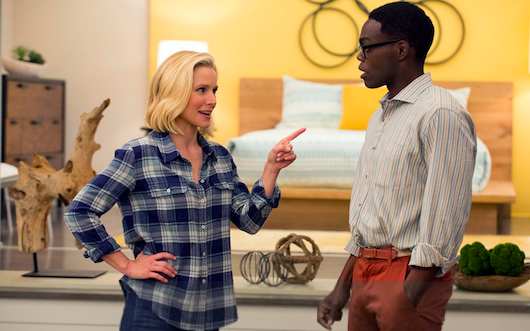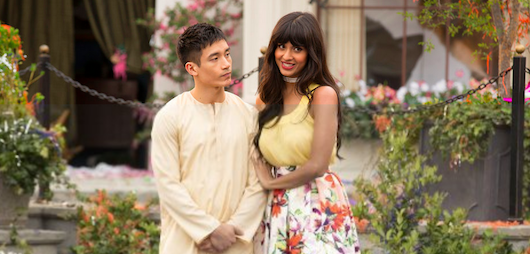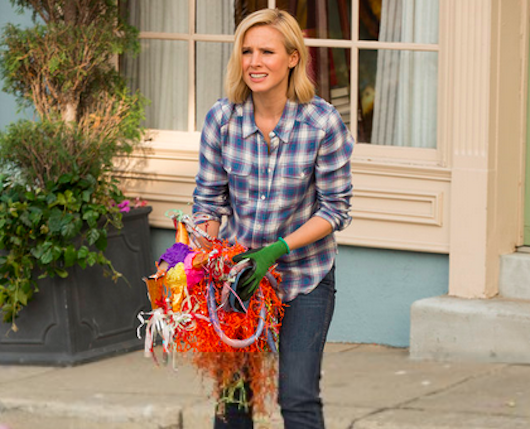 FILM
FILM In Which Jim Jarmusch Stole From Everywhere
 Thursday, October 6, 2016 at 10:56AM
Thursday, October 6, 2016 at 10:56AM 
Way of the Samurai
by ETHAN PETERSON
"I still think of myself as an amateur filmmaker," Jim Jarmusch announces on Tuesday for the thousandth time. Minutes later, he mentions that he smoked cigarettes for most of his life. "I took a week to quit," he says. Equipped with Allen Carr's book about smoking, he took a week off from anything to purge himself of nicotine. Kihachi Okamoto's The Sword of Doom was his only panacea, he explains to a crowd gathered at the New York Film Festival. He describes the film and shows a piece of it, explaining that it is the most nihilistic movie ever made.
The first clip Jarmusch shows the audience is the bravura opening to Samuel Fuller's The Naked Kiss. It is maybe the best thing Fuller ever did and the opening sequence, where a prostitute good-naturedly batters her drunk pimp for the money she is owed, almost reminds me more of Jarmusch than Fuller. The only time Jarmusch mentions his own films during the evening is in passing, since this event is centered around his own influences in film. It emerges that Jarmusch worked or was friendly with an astonishing number of important directors over the course of his long career.

Jim Jarmusch was Nicholas Ray's assistant and lived in his apartment while the director was dying of lung cancer. Ray always told him to be a dillentante – someone who had many, varied interests. Some of the interests Jarmusch mentions to the audience are comparative literature and the naming of mushrooms. (You get the sense that Jarmusch did not simply name them.) He describes a talk he did in Washington D.C. where he interviewed Martin Scorsese; one talking slow as molasses and the other's mouth running a mile a minute.
Of course Jarmusch knew Fellini as well. He never mentions much about the man's films – Jarmusch draws a subtle distinction between directors who he was interested in as people because he saw them in much the same way he sees himself, and men who are brilliant artists from whom he can learn or take something. (His story about Fellini is how annoyed the director was to be driven to the set.) He shows the audience an incredible sequence from Dino Risi's Il Sorpasso, where two Italian men drive around an empty Rome, harassing motorists. He does not explain something I would have liked to know – what he finds so telling about a movie where two mismatched people are on a journey together.

His thoughts about John Boorman's Point Blank, his amazing version of the Robert Parker novel, are much more in depth. Every time he starts watching Point Blank, he says, he watches it from start to finish because it draws him again. ("It's the same with Goodfellas," he says.) Lee Marvin is just Jarmusch's type of actor: completely solid and nuanced, yet projecting a deep, underlying emotionality. Jarmusch describes the performances he saw during the semester abroad he spent in Paris not studying. At times Jarmusch seems to be straddling two different generations of film: he is between moments, a man who has seen almost too much. Maybe that's why Ray told him to take from everywhere.
Recently a friend of mine showed me a list of David Fincher's favorite movies. It was pretty rough and nothing was older. Jarmusch shows off a Buster Keaton sequence from 1924's The Navigator where he and Kathyrn McGuire search a boat for each other. I'm not entirely sure what Jarmusch likes about Keaton – perhaps the sense of the human being as merely another aspect of larger landscape? Jarmusch's new film, Paterson, stars Adam Driver as a bus driver in New Jersey.

My favorite of Jarmusch's films is easily Ghost Dog: Way of the Samurai. He shows off scenes from other "hitman movies", as he calls them, which inspired his version of the same. Melville's Le Samuraï is at the top of this list, and he explains how Melville came by his career and what he was hoping to achieve as an artist. Melville's obsessive nature paralleled the illness of his protagonist Jef Costello. Jarmusch pairs that clip with a section of Branded to Kill by Seijun Suzuki, where an assassin shoots his target from an impossible angle. Suzuki is still alive, he claims, and describes talking to Park Chan-Wook about the man. The audience nods appreciatively like a bunch of hipster idiots.
What is not very surprising is that Jarmusch seems like a well-adjusted human being. Especially in his appreciations of Kiarostami and Kaurismäki, he is wonderful at talking about or to people in a way that preserves their humanity and places he himself no higher or lower in the hierarchy of the universe. All of Jarmusch's important films are by male directors, which is not really too unexpected given that the vast majority of his work explores different types and personifications of a disturbed masculinity. "I was lucky enough to spend time with Samuel Fuller," he says, "and after, he died, with his family." Whatever sadness there is in that statement he is properly detached from – the sense that the world is at arm's length, but at least it is no further.
Ethan Peterson is the senior contributor to This Recording.

 ethan peterson,
ethan peterson,  jim jarmusch
jim jarmusch 









































